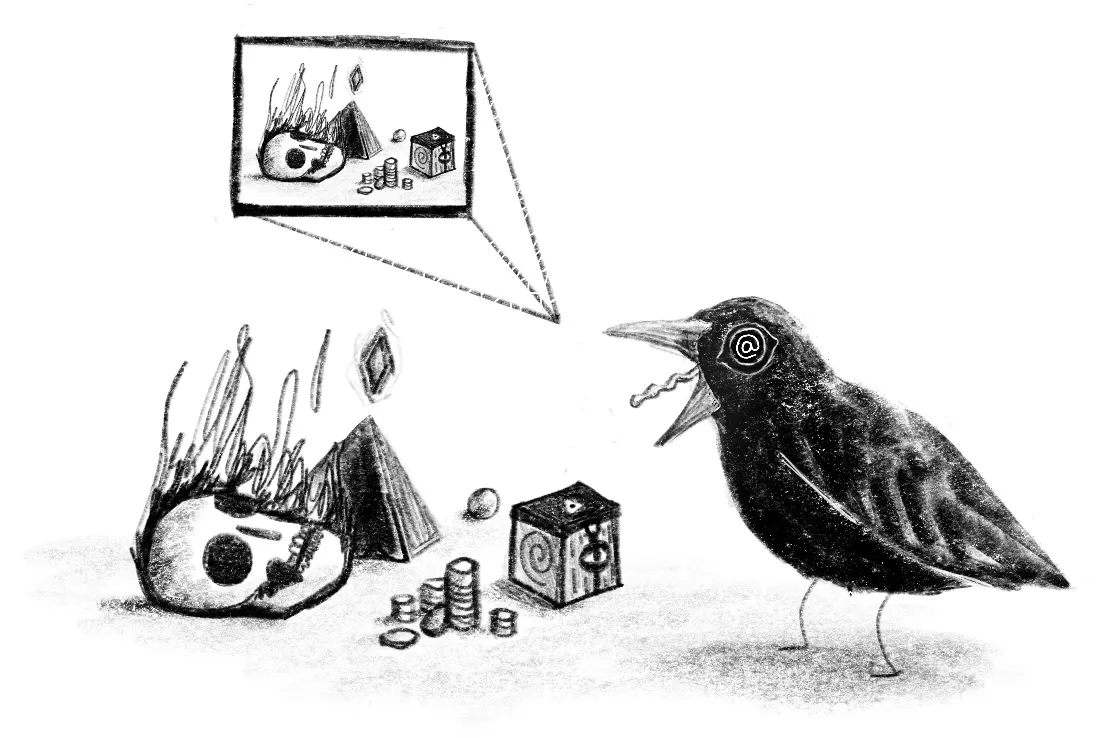Why your world needs an internet-analogue
Adding an internet-analogue to your TTRPG games can improve your games by:
- making information gathering more efficient
- increasing player agency
- adding new avenues for compelling storytelling.
In this article:
The components of the Web
An internet-analogue—a.k.a. the Web—is a system that approximates the form and function of the real-life internet for use in TTRPG games. Specifically, it’s a collection of fictional elements and mechanical procedures that together enable a novel approach to information dissemination that you can overlay onto your TTRPG game.
Fictional Elements
These elements are the things that exist in your world related to the Web. Give your players an Interface to start, and assume their characters know how to operate it. Use the Open Questions to flesh out your Web. At the end of this article, you’ll find some more examples of different Webs to help you get started.
| Element | Example |
|---|---|
| Interface | Stretchy arcane slime-phone, sparkling with crystalline pixels that display Web content |
| Infrastructure | Satellite space boulders emanate magic radiation that connects slime-phones to each other at long distances |
| Usage Cost | Each Web access slowly discharges your slime-phone. Roll 1d6; on a 1, your slime is sapped until next moonrise. |
| Open Questions | Where did the space boulders come from? How are slime-phones created? What are their qualities? |
Mechanical Procedures
The procedures in this article provide optional rules for using the Web. These rules should cover most cases, but feel free to adjust them as you see fit.
| Procedure | Usage |
|---|---|
| Make a Query | Search the Web for factual information, community opinions, recent rumors, gig postings, etc. |
| Make a Post | Post a question, list something for sale, share an opinion, advertise a gig, etc. |
| Make a Connection | Ask someone to become a Contact, call a Contact, message a Contact, etc |
| Check Notability | Is the subject notable enough to be on the Web? |
Some examples of internet-analogues in play

Upon slaying the Gorge Demon, your party finds a huge onyx stone in the creature’s gut. The party’s wizard queries the Arcane College’s vast knowledge wiki by carving a rune into her Web Slab. The wiki says the stone is coveted by many as a key piece of a world-ending ritual…

Blood-soaked and barely alive, the party’s sorcerer Wren emerges from the Hellborne Portal clutching a variety of fiendish loot. Wasting no time, Wren ritual e-summons the Auction Starling, who helps Wren list his treasures for sale on the Web. Later, Wren receives a lucrative offer, but the buyer asks for hand-delivery to the Celestial Sanctum…

Deep underground in the depths of Hollowdark Crypt, your party discovers a runic code etched in the eye of a stone cyclops statue. The wizard Basil skull-scans the code, and within seconds he mentally receives a map of the whole Crypt… plus a massive secret chamber!
How the Web can improve your game
More information = more player agency
With the Web, information that players might have had to discover in person is now accessible on-demand via the Make a Query procedure. Informed players make meaningful decisions and have more fun.
Broader influence creates more interesting choices
On the Web, players can Make a Post to exert influence onto the game world without having to physically be in a specific location. Similarly, players can Make a Connection to talk to NPCs (and each-other) at potentially-infinite range. Both procedures add an entirely new dimension of choice to many situations.
Less obfuscation = less friction
When players Make a Query, you can sometimes share your prep notes directly, like descriptions of factions or lore about creatures. With the Web, character knowledge becomes more aligned with player knowledge, which reduces friction.
Reduce prep by embracing improvisation
If players Make a Query about something that you haven’t prepared, take the opportunity to improvise an answer, generate something on-the-fly using a random table (or the actual internet), or even ask your players for suggestions.
Optimize game flow by getting players un-stuck
If the party gets stuck and feels frustrated, the Web can move things along: the Web can connect players to helpful NPCs, relevant information, and alternative routes through many kinds of obstacles. If necessary, GMs can “ping” the party’s Web interface with information, or simply remind players to Make a Query, Make a Post, or Make a Connection if they get stuck.
Customizing your Web
When adding the Web into your world, whether it’s for an existing game or a brand-new one, you have flexibility with how you implement the Web. You could simply give your players a magic orb that has an encyclopedia wiki on it and call it a day. Or, on the other end of the spectrum, you could decide what the physical infrastructure of the internet looks like, who operates the infrastructure (and why), who uses the internet, and other such things.
One axis of choice is the volume of content on your Web. Maybe there’s only one “main” website, and it’s a chatroom. Perhaps each settlement has its own homepage, with local maps and job postings. Or maybe the Web is as diverse as the real internet, with millions of websites and users from around the world. Think about which denizens of your world would use or even know about the Web.
You should also consider the accuracy of the information on your Web. An internet rich with universally-true information can help players identify new things quickly and stay engaged. On the other hand, your Web can be a collection of many disparate sources rife with misinformation, which can seed potential twists and challenges into long-term gameplay. The internet is a flexible tool for you to provide information to the players; consider carefully how much trust you’d like your players to have in the internet. With too little trust, players might avoid using it altogether, but a bit of doubt can cause players to wonder about who’s actually writing the content they’re reading.
All of these choices will change the dynamic of the game. Take advantage of the freedom of the Web to minimize parts of the game that you or your players find tedious or uninteresting. The choice is yours. Choose what appeals to you and what works with your preferred style of game.
At the end of this article, you’ll find four example Webs that you can use as starting points for your own Web.
Using the Web: Procedures
These procedures are player-facing and player-driven. In addition, the GM should readily offer suggestions for procedures players might want to perform. When players Make a Query, Make a Post, or Make a Connection, they must pay the Usage Cost of your Web. It’s free to Check Notability.
Procedure: Check Notability
Is BLANK notable enough to be on the Web?
You can Check Notability only once per subject. Also, the GM can always decide whether something is notable; use this procedure when there’s uncertainty.
- How many Web users might know about BLANK? Choose a number between 1 and 6, where 1 is few people and 6 is close to everyone.
- Roll a d6. If your number is equal to or less than the number from step 1, it’s notable enough to be on the Web.
- Write down whether BLANK is notable or not somewhere on the shared party sheet, since you may use this information in the future.
Procedure: Make a Query
Search the Web for factual information, community opinions, recent rumors,
- Choose a type of website to query: wiki, forum, map, search engine etc.
- Choose a subject, e.g. Lord Skellec III, blue-crested warblers, Crescent Sea, the cheese industry in Kantos, the Infernal Gate of the Blood Moon, etc.
- Make a Notability Check about the subject. If the subject is not notable, you cannot Make a Query about it.
- Roll a d6. You may ask that many questions about the subject, and the GM should provide an answer for each one. Depending on the subject, the question, and type of website, the GM may choose to give no answer or an incorrect answer.
Procedure: Make a Post
Post a question, list something for sale, share an opinion, advertise a gig, etc.
- Choose a type of website to post on: forum, marketplace, chatroom, etc.
- Decide on the content and intent of the post. Write the name, summary, or exact text of your post in the Posts section of the shared party sheet.
- Every morning (until you decide to remove the post), roll a d20 to see what kind of response your post has received:
Roll | Result | Details |
|---|---|---|
| ≥13 | Positive | e.g. your question was answered, your sale got some offers, your opinion sparked an interesting discussion, your gig got quality applicants. The higher your roll, the better the response. |
| 5-12 | No response | Check again tomorrow. |
| 1-4 | Negative | e.g. your question was spammed with bad info, your sale attracted scammers, your opinion led to dangerous attention, your gig was applied to by unsavory folks. Negative responses should cause an immediate problem or start a clock. |
Procedure: Make a Connection
Send a direct message, start a group chat, make a call, etc.
- Choose the recipient(s) of the connection. Check Notability if a recipient is not already a Contact on your shared party sheet; then, if the recipient is notable, add them as a Contact; if not, you cannot Make a Connection.
- Choose the type of connection: text message, voice call, video call, etc. This choice may depend on the particular flavor of Web that you’re using.
- The GM will determine if the recipient(s) accepted the connection request. If they accept, you may have a conversation with the recipient(s) as if it were a typical NPC conversation.
Starter Webs
Use these to kickstart your internet-powered game.
root.web
Commune with wise trees to access the root data network
Interface
Speak with the trees, or hire a druid to do so for you. Alternatively, evocation wizards can—with proper training and a long metal rod—tap directly into the electricity coursing through the roots underground.
Infrastructure
Trees are observant, wise, and generous. Fungal mycelia connects trees’ roots to form a vast network, which lets trees communicate freely with each other. Old trees with larger root networks can convey more information, but take a long time to ponder their many thoughts.
Usage Cost
Unless you can commune with plants, you’ll need to hire a druid or a wizard. Most druids want payment in favors, and wizards trade in knowledge and secrets.
Open Questions
- As sapient beings, what role do trees play in society?
- Are specific trees well-known?
- Do other plants have a role in the Web?
- Can anyone observe Web usage by electro-tapping the roots?
- What training is required for a wizard to electro-tap the Web?
cyberpunk.web
Use cybernetics to jack-in to brutalist corpo-terminals
Interface
Neuro and ocular cybernetic implants. Folks with implants—known as Webjocks—visualize websites in 3D space and can interact with the Web at the speed of thought.
Infrastructure
Dwarven metal pipes exist in a massive underground network, with braided unicorn hair running through the pipes. Webjocks jack-in to the Web above-ground at huge brutalist stone terminals.
Usage Cost
Implants cost a few thousand gold, but once you’re implanted, Web access is free (assuming you’re jacked-in to a terminal). Can’t afford an implant? Sign an Adventurer’s Contract™ with a mega-corp; they’ll fund your implants and the operation for a 25% cut of all your future loot.
Open Questions
- Who makes and installs the implants?
- What do Web terminals look like, and where are they found?
- Who constructed the infrastructure, who maintains it, and why?
- Is the infrastructure expanding, or is it a legacy of a bygone civilization?
- What mega-corps are there, and what power do they have?
spider.web
Etch runes into wax to attract hungry data-spiders
Interface
Soft wax tablets called Slabs that are speckled with tiny arcane crystals. Inscribe runes on Slabs using a special bone stylus, and then dissolve the Slab in water to perform various functions.
Infrastructure
Vast networks of crystalline spider webs in the ethereal plane connect at server webclusters that float in the material plane. Small messenger-spiders scurry along these webs, ferrying information between Slabs and servers.
Usage Cost
Slabs are consumable: upon use, the wax dissolves in water and the tiny crystals in the wax are devoured by the messenger-spiders.
Open Questions
- What creatures prey on the messenger-spiders?
- Who creates the Slabs and why?
- Where can Slabs be purchased or obtained?
- Why do the messenger-spiders operate the internet in this way?
- Is this Web natural, or was it manufactured?
- Are the floating webclusters revered, feared, or considered mundane?
haunted.web
Summon fiendish familiars to beckon bit-whispering souls
Interface
Animal familiars that dictate web content. Talk with familiars in plain language to use the Web. Each website has its own kind of familiar.
Infrastructure
Restless spirits, under the thrall of demonic corporations, flit around the ethereal plane exchanging data-whispers with each other. Cemeteries are internet hotspots, and most holy areas are dead zones. Tall black mausoleums act as information hubs and data centers.
Usage Cost
Summon familiars temporarily by performing small rituals. Ritual costs depend on the website, but all rituals take a few minutes and a few coins to perform.
Open Questions
- What does a Web-access ritual look like?
- Are familiars sentient or are they automatons?
- What is the role of necromancy and the occult in this kind of Web?
- How does one learn about new rituals and websites?
- What incentives does a ghost-based Web introduce?
- On the material plane, who primarily does business with the devils who run the fiendish corporations?
Thanks for reading!
- Cam